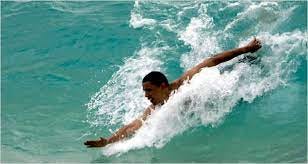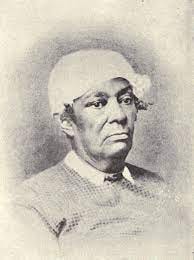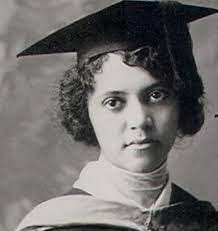Aloha,
When we think of prominent Black newsworthy individuals from Hawai’i, our minds immediately go to Barack Hussein Obama, Island son and global leader whose political outlook and public policy reflected his perspective on the joys, complexities, and understanding of culture shaped by his youth in Hawai‘i.
Among other accomplishments, Obama is an awesome bodysurfer. Here he is at Sandy’s!
Black History Month and Hawai’i
Betsy Stockton and Alice B. Ball made significant contributions to Hawai‘i's growth and existence, and changed the lives of thousands of people through their dedication to education and science in the 19th and 20th century.
Blacks in Hawai‘i constitute 2.2% of the local population, yet have shaped discussion regarding the nation-state that intersects with Hawaiian sovereignty and rule of law, and the particulars of the community’s struggle for respect and humanity obliges us to examine how we prioritize our dollars, efforts, and beliefs in a polycultural world.
White missionaries were primarily focused on educating the Hawaiian elite, but
Betsy Stockton had other plans. She arrived in Lahaina, Maui in 1823 learned the Hawaiian language, and established a school for commoners that eventually became an influential learning institution for generations of Hawaiian people. The school is in operation today and is better known as Lahainalua High School. It’s still going strong after 200 years! Maui Nō Ka ʻOi!
Scientist Alice A. Ball made a 1915 discovery crucial to Hansen’s disease or leprosy. Hawai‘i had a draconian medical segregation policy that consigned those stricken with the disease to a remote settlement on Moloka‘i. People were forced to abandon their lives and exiled. Thanks to Ball’s research many received treatment. Her co-teacher and then president of the College of Hawai‘I, Arthur L. Dean, disclosed their research findings after Ball’s untimely death at age 24, but took her name off the paper. Fortunately, Dr. Harry T. Hollmann published a paper properly giving her credit for her work. February 29 is officially Alice A. Ball day in the state of Hawai‘i.
Other interesting figures include Anthony D. Allen and the men who sailed here as lascars including Black Jack or Kaka’ele’ele.
Black History is American History—and important for us to consider as we grasp the reach of the American Empire. To know of the history of Black Americans is to grapple with the complexity of race, the nuance of belonging, and the mythic belief in the national project. As many in Hawai’i continue to wrestle with the price of membership to the U.S. – learning about the lives of those of African descent will help us to carefully examine the limits and challenges of nation.
Black Writers and Voice
My journey as an author was shaped by Black writers. At the age of 16, I read the book Chinamen, and then a year later, The Woman Warrior by Maxine Hong Kingston. This newsletter’s title is an homage to the reading experience the books provided. Prior to reading those titles I had never read a single book that featured an Asian character. This profoundly shaped the conception I had of myself. The few stories I had access to in my youth that allowed me to understand difference were those written by Black Americans.
My sense of race, of identity, of belonging within the context of the US was shaped by Black narratives. There was no other way for me to grasp the idea of discrimination or inequity, and these stories gave me words to understand that a belief in family and resilience could carry me through. I needed those words on the page. From an early age I had retreated to books for refuge from the world that surrounded me. So if something was in a book, it bolstered my belief in whatever I encountered. The stories I read as a younger child were varied, but the ones probably written by both Black and White authors (That would be my educated guess given the dearth of working Black authors in the early 1970s…but I could be wrong) about enslavement, migrancy, school, and coming of age that directly addressed the structural inequities of American life centered Black families.
I was a Korean American child growing up in Iowa. The stories I read about Black children helped me to not only feel less alone, as all books can do, but to understand how and why I might not be welcome due to the cruelty of racism, and to know that I could find people who did not think in this way.
The reading of Alex Haley’s Roots at age 12 changed my life because it gave me another way to see the world. I was glued to this book. I lugged the heavy hardback to my church bell choir meeting and sat reading the book at the table while everyone else ate dinner and talked. I liked ringing bells. But I was never much at home with the children in the choir. I ate and read. Only the choir mistress spoke to me about the book and television series. The book kept me company. It saved me from socializing. It gave me a history. I belonged in those pages.
It was through reading Black writers that I started to develop a vocabulary around justice and humanity. I came to feel less alone. The words by Black writers helped me to claim a dignity around my being. I was different. But reading showed me that others were different too and lived full and complete lives.
I’m an Asian American writer and have read a great deal of this particular body of work, as well as much of the theoretical writing surrounding literature. But I read Asian American literature as an adult. The number of books by Asian American authors has exponentially grown since I was a child. I am honored and humbled to be a part of this cohort. I am aware, however, that without having flipped open the pages of Alex Haley and Richard Wright’s books as a young person, I would have never moved on to Kingston’s. One book leads to another. Black writers helped me find my voice. They helped me to accept who I was. I am deeply grateful for all the ways they have shaped our discourse as a nation and as a community of readers and thinkers. Black literature is American literature and in the end, a global literature.
Women. Warriors. Writers.
How do we come to love and respect each other? We can start by reading. Below are authors who have courageously invited us into the world they inhabit through the art of literature. We read to understand who we are on this great vast earth for this very brief time.
Let us read and enter the dream state, imagining who we can be, by acknowledging who we are. To readers and writers, and most importantly in this case, to teachers: here are some writers for you to consider.
Emily Bernard, Artress Bethany-White, Shonda Buchanan, Lorene Cary, Nana-Ama Danquah, Carolyn Ferrell,N.K. Jemisin,Toni Ann Johnson, ZZ Packer, Renee Simms, Zadie Smith, Camille Wanliss, Jesmyn Ward.
Subscribe to my Youtube Dr. Stephanie Han for pedagogical strategies, health tips, reading and writing and creative process info.
If you have a question, on reading, writing, or creative process drop me a line. It may appear in my THROB (The Hawai’i Review of Books) column The Doctor is In.
Have a fantastic Black History Month!






